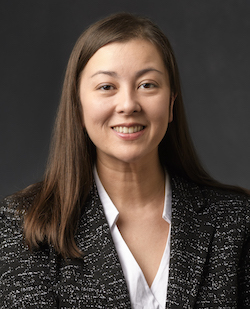Graduate Student Seminar
September 06, 2024
12:45 p.m. ET
Wean Hall 7500
September 06, 2024
12:45 p.m. ET
Wean Hall 7500
The objective of this talk is to demonstrate the many and varied effects of irradiation-induced defects on mechanical martensites in fcc structural alloys. When these alloys are exposed to far-from-equilibrium extremes such as irradiation or corrosion, they can evolve hierarchical defect structures spanning multiple length scales – point defects, extended defects, and mesoscopic defects. These hierarchical defect structures have historically been associated with localized deformation modes such as dislocation channeling. However, the role of these defects on activating diffusionless, deformation-induced martensitic phase transformations have only recently been brought to light. We will first demonstrate the role of point defects, extended defects, and cracks, in activating martensitic transformations in austenitic stainless steels, using a series of in situ and ex situ small-scale mechanical tests coupled with molecular dynamics (MD) simulations. These approaches will then be extended to high-stacking fault energy (SFE) Ni-based alloys that are not expected to exhibit deformation-induced martensitic transformations, and to shape-memory alloy NiTi that exhibits reversible (elastic) martensitic transformations. We will show that irradiation defects can be used to tailor the activation of martensitic transformations over a wider range of loading conditions and SFEs than previously thought.
 Janelle P. Wharry, University of Illinois at Urbana-Champaign
Janelle P. Wharry, University of Illinois at Urbana-ChampaignWharry is a Professor of Mechanical Science & Engineering at the University of Illinois at Urbana-Champaign (as of August 2024), prior to which she was an Associate Professor of Materials Engineering at Purdue University. Her research group focuses on understanding structure-property-functionality relationships in irradiated materials, with an emphasis on deformation mechanisms and mechanical behavior at the nano/microscale. The group’s active projects span nuclear structural and cladding alloys, advanced manufacturing and joining methods, metallic nuclear fuels, and electroceramic materials. In recognition of her research, Dr. Wharry received the DOE Early Career Award, National Science Foundation CAREER Award, and American Nuclear Society (ANS) Landis Young Member Award. She has mentored 25 graduate/post-doctoral researchers and published 100+ peer-reviewed journal articles and refereed conference papers. She is also an Editor of Materials Science & Engineering A and Materials Today Communications. Dr. Wharry serves as Chair of the DOE Nuclear Science User Facilities (NSUF) Scientific Review Board, and was previously General Chair of the inaugural 2019 Materials in Nuclear Energy Systems (MiNES) Conference. She received her Ph.D. in Nuclear Engineering & Radiological Sciences from the University of Michigan in 2012.
February 20 2026
10:00 AM ET
Materials Science and Engineering
High-Fidelity Atomistic Simulations of Chemistry-Microstructure Interactions in Metals, presented by Rodrigo Freitas, Massachusetts Institute of Technology
CUC McConomy Auditorium
February 20 2026
5:30 PM - 9:30 PM ET
Highmark Center for Health, Wellness and Athletics (100 Tech St, Pittsburgh, PA 15213)
February 24 2026
12:00 PM ET
Materials Science and Engineering
"Modeling the Nonequilibrium Dynamics and Rheology of Associative Polymer Networks," presented by Songyue Liu
6142 Scott Hall
February 25 2026
2:00 PM ET
Faculty Insights with Mario Berges
Please join us for CMU Engineering's virtual program, “Faculty Insights: A 20 Minute Briefing.” In this series, faculty will share insights into their research, its impact, and provide perspective for the future of the field.
Virtual, link provided to registrants
February 27 2026
10:00 AM ET
Materials Science and Engineering
AI meets Peer Review: The Good, The Bad, and The Ugly, presented by Nihar Shah, Carnegie Mellon University
CUC McConomy Auditorium
March 13 2026
10:00 AM ET
Materials Science and Engineering
presented by Rachel Goldman, University of Michigan
CUC McConomy Auditorium